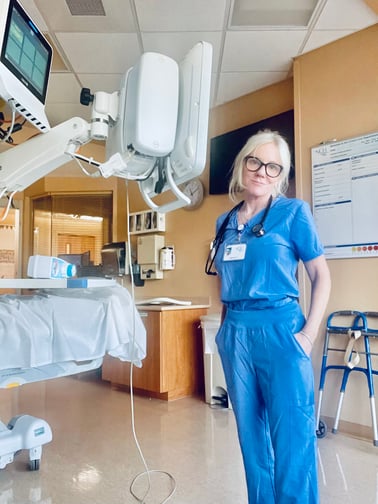In honor of this year’s National Nurse Week, we wanted to highlight the importance of nurses in the execution of clinical trial research throughout the globe. We were honored to speak with Meghan Fitzgerald, BSN, MPH, DrPh, who knows all too well the key role that nurses play in supporting clinical trials. Meghan is a licensed nurse (currently finishing an NP degree), healthcare investor, author and academic with two decades of experience working across the healthcare industry, ranging from frontline patient care to advising prominent global healthcare firms.

1. What are the key responsibilities of a nurse in supporting clinical trials? At site and at home?
The role of nursing in clinical trials is vast and important. Nurses work in several areas from patient engagement and safety, including administering medicines to working on and maintaining the integrity of the study protocol, all the way through data collection and FDA submission of the medicine. Throughout my career, I have worked with many nurses who were designing the study, working on the study, or submitting the study. Nurses can work for the site or sponsor. It’s a great field for nursing as their skills in patient care, science and data are all required and valued.
2. Can you offer personal experience of supporting patients through placebo controlled clinical trials?
In terms of placebo-controlled trials, especially double-blinded trials, there are important ethical considerations for all involved. Back in college, I was enrolled in an asthma clinical trial and was in the placebo arm. I figured it out and was bummed and asked to leave. My allergist celebrated my responsibility in the trial in advancing a medicine that would go on to help thousands. The study team opened my eyes to the role I played as a placebo participant. This was really brought to light during COVID where the placebo arm was critical in getting these medicines approved.
Today I am a board member and investor in clinical research companies, and I see firsthand how enormous our responsibility is to the patient, provider, and science. Remote trials, data, AI and new innovation in the field of trial science is helping us find clinical answers faster but never at the cost of quality, safety, or integrity.
3. We often hear that the element of trust between patients and their nurses makes a huge difference in treatment success and patient experience. Do you believe that DCT/virtual trials can support/re-create the in-person (at site) experience patients report as crucial to their experience?
I am never surprised when “nursing and trust” is commingled as a claim. For the 21st year in a row, nursing was rated as the most trusted profession according to the Gallup poll.
In terms of virtual trials, patients have been conditioned to get consumables, food (human and pet), and care in their homes. The pandemic teleported many trends by five years.
The opportunity is for clinical care to execute on the right ratio of humans to tech in achieving better quality, outcomes, cost, and speed-to-market.
4. How has technology changed the degree of time nurses can engage with patients rather than paperwork, processes, etc.? Have things gotten better or worse?
Data integrity is critical to scientific and regulatory compliance. I think it’s the most critical part of clinical research. Global teams connected by data, products and patients are on the hook to ensure integrity as a minor breach can have disastrous consequences including having to redo a trial or miss an FDA submission. This is especially true with lifesaving medicines in oncology or rare disease, where a data mistake is analogous to an unforced error during a championship game. The stakes are high.
5. What strategies can be implemented to support nurses in managing their workload and preventing burnout? Can technological advances help with this?
It's challenging for nurses (and first responders) who work in an acute setting (ED, ICU, surgery) to work remotely. I think the field of clinical research is a field that offers a hybrid component where the non-patient facing work can be done with technology or remotely. In some ways, we may help to inform new models of patient engagement and care.
6. Can technological advances help with this?
Given the burden of a growing aging population and the speed of research in cell and gene therapy, we need more nurses to enter the field which requires “selling the field” as an exciting and viable place to work. I think clinical trial research and data science are great fields for nurses given the industry need coupled with nurses’ dual quantitative and qualitative skill set. Most nurses love patients and science in equal measure. When given the chance, I always lean in and hire a nurse as they often exceed expectations and just work the problem.
Jake Lindamood
Jake Lindamood, Marketing Manager at 4G Clinical, has over three years of experience in the RTSM industry in addition to two years of experience in product marketing and campaign management within the lighting industry. Jake uses his passion for storytelling as a source of inspiration in an industry built around...
